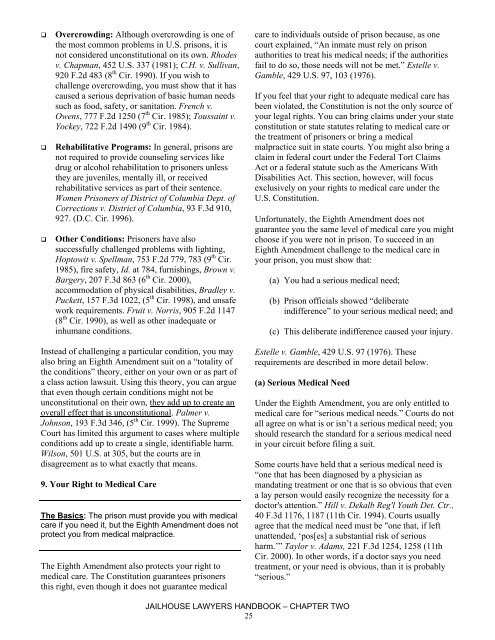Jailhouse Lawyer's Handbook - Sentencing and Justice Reform ...
Jailhouse Lawyer's Handbook - Sentencing and Justice Reform ...
Jailhouse Lawyer's Handbook - Sentencing and Justice Reform ...
Create successful ePaper yourself
Turn your PDF publications into a flip-book with our unique Google optimized e-Paper software.
Overcrowding: Although overcrowding is one of<br />
the most common problems in U.S. prisons, it is<br />
not considered unconstitutional on its own. Rhodes<br />
v. Chapman, 452 U.S. 337 (1981); C.H. v. Sullivan,<br />
920 F.2d 483 (8 th Cir. 1990). If you wish to<br />
challenge overcrowding, you must show that it has<br />
caused a serious deprivation of basic human needs<br />
such as food, safety, or sanitation. French v.<br />
Owens, 777 F.2d 1250 (7 th Cir. 1985); Toussaint v.<br />
Yockey, 722 F.2d 1490 (9 th Cir. 1984).<br />
Rehabilitative Programs: In general, prisons are<br />
not required to provide counseling services like<br />
drug or alcohol rehabilitation to prisoners unless<br />
they are juveniles, mentally ill, or received<br />
rehabilitative services as part of their sentence.<br />
Women Prisoners of District of Columbia Dept. of<br />
Corrections v. District of Columbia, 93 F.3d 910,<br />
927. (D.C. Cir. 1996).<br />
Other Conditions: Prisoners have also<br />
successfully challenged problems with lighting,<br />
Hoptowit v. Spellman, 753 F.2d 779, 783 (9 th Cir.<br />
1985), fire safety, Id. at 784, furnishings, Brown v.<br />
Bargery, 207 F.3d 863 (6 th Cir. 2000),<br />
accommodation of physical disabilities, Bradley v.<br />
Puckett, 157 F.3d 1022, (5 th Cir. 1998), <strong>and</strong> unsafe<br />
work requirements. Fruit v. Norris, 905 F.2d 1147<br />
(8 th Cir. 1990), as well as other inadequate or<br />
inhumane conditions.<br />
care to individuals outside of prison because, as one<br />
court explained, “An inmate must rely on prison<br />
authorities to treat his medical needs; if the authorities<br />
fail to do so, those needs will not be met.” Estelle v.<br />
Gamble, 429 U.S. 97, 103 (1976).<br />
If you feel that your right to adequate medical care has<br />
been violated, the Constitution is not the only source of<br />
your legal rights. You can bring claims under your state<br />
constitution or state statutes relating to medical care or<br />
the treatment of prisoners or bring a medical<br />
malpractice suit in state courts. You might also bring a<br />
claim in federal court under the Federal Tort Claims<br />
Act or a federal statute such as the Americans With<br />
Disabilities Act. This section, however, will focus<br />
exclusively on your rights to medical care under the<br />
U.S. Constitution.<br />
Unfortunately, the Eighth Amendment does not<br />
guarantee you the same level of medical care you might<br />
choose if you were not in prison. To succeed in an<br />
Eighth Amendment challenge to the medical care in<br />
your prison, you must show that:<br />
(a) You had a serious medical need;<br />
(b) Prison officials showed “deliberate<br />
indifference” to your serious medical need; <strong>and</strong><br />
(c) This deliberate indifference caused your injury.<br />
Instead of challenging a particular condition, you may<br />
also bring an Eighth Amendment suit on a “totality of<br />
the conditions” theory, either on your own or as part of<br />
a class action lawsuit. Using this theory, you can argue<br />
that even though certain conditions might not be<br />
unconstitutional on their own, they add up to create an<br />
overall effect that is unconstitutional. Palmer v.<br />
Johnson, 193 F.3d 346, (5 th Cir. 1999). The Supreme<br />
Court has limited this argument to cases where multiple<br />
conditions add up to create a single, identifiable harm.<br />
Wilson, 501 U.S. at 305, but the courts are in<br />
disagreement as to what exactly that means.<br />
9. Your Right to Medical Care<br />
The Basics: The prison must provide you with medical<br />
care if you need it, but the Eighth Amendment does not<br />
protect you from medical malpractice.<br />
The Eighth Amendment also protects your right to<br />
medical care. The Constitution guarantees prisoners<br />
this right, even though it does not guarantee medical<br />
Estelle v. Gamble, 429 U.S. 97 (1976). These<br />
requirements are described in more detail below.<br />
(a) Serious Medical Need<br />
Under the Eighth Amendment, you are only entitled to<br />
medical care for “serious medical needs.” Courts do not<br />
all agree on what is or isn’t a serious medical need; you<br />
should research the st<strong>and</strong>ard for a serious medical need<br />
in your circuit before filing a suit.<br />
Some courts have held that a serious medical need is<br />
“one that has been diagnosed by a physician as<br />
m<strong>and</strong>ating treatment or one that is so obvious that even<br />
a lay person would easily recognize the necessity for a<br />
doctor's attention.” Hill v. Dekalb Reg'l Youth Det. Ctr.,<br />
40 F.3d 1176, 1187 (11th Cir. 1994). Courts usually<br />
agree that the medical need must be "one that, if left<br />
unattended, ‘pos[es] a substantial risk of serious<br />
harm.’” Taylor v. Adams, 221 F.3d 1254, 1258 (11th<br />
Cir. 2000). In other words, if a doctor says you need<br />
treatment, or your need is obvious, than it is probably<br />
“serious.”<br />
JAILHOUSE LAWYERS HANDBOOK – CHAPTER TWO<br />
25





